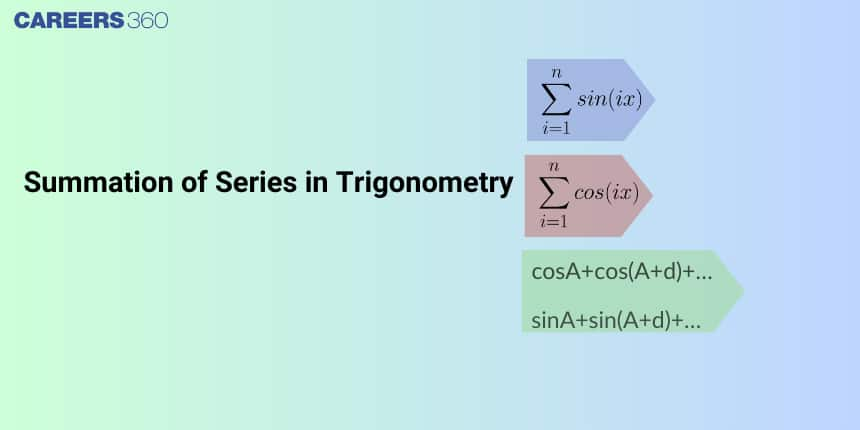Summation of Series in Trigonometry
Before delving into the trigonometric series, let's first understand what a is series. If we add or subtract all the terms of a sequence we will get an expression, which is called a series. It is denoted by Sn. Trigonometric series are expressions that involve the sum of trigonometric functions such as sine, cos, etc. It is a vital tool for mathematical analysis.
JEE Main: Study Materials | High Scoring Topics | Preparation Guide
JEE Main: Syllabus | Sample Papers | Mock Tests | PYQs
- Trigonometric Series
- Trigonometric Series Formula
- Solved Example Based on Trigonometric Series

Trigonometric Series
In trigonometry, there are six basic trigonometric functions. These functions are trigonometric ratios that are based on ratios of sides in a right triangle: the hypotenuse (the longest side), the base (the side adjacent to a chosen angle), and the perpendicular (the side opposite the chosen angle). These functions are sine, cosine, tangent, secant, cosecant, and cotangent. They help us find different values in triangles by comparing these side lengths.
Trigonometric Functions Formulas
Using the sides of a right-angled triangle, we may use specific formulas to get the values of the trigonometric functions. We utilize the shortened form of these functions to write these formulas. The notation for sine is sin; the notation for cosine is cos; the notation for tangent is tan; the notation for secant is sec; the notation for cosecant is cosec; and the notation for cotangent is cot. The basic formulas to find the trigonometric functions are as follows:
Trigonometric Series Formula
For sine series
Proof:
Let
Here angle are in A.P. and common difference of angles
Adding all the above we get
For cosine series
In the above result replacing '
Recommended Video Based on Trigonometric Series
Solved Example Based on Trigonometric Series
Example 1: The value of
1)
2)
3)
4) None of these
Solution
Here
Hence, the answer is option 2.
Example 2: The sum of
1)
2)
3)
4) None of these
Solution
Here
Hence, the answer is option 3 .
Example 3: Let
1)
2)
3)
Solution
Hence, the answer is the option 3 .
Example 4: The value of
1)
2)
3)
4)
Solution
The trigonometric ratios for angles in all the four quadrants.
Example 5: The value of the sum
1)
2)
3)
4)
Solution
Hence, the answer is the option 3.
Also Read
15 Feb'25 10:27 AM
15 Feb'25 09:37 AM
13 Feb'25 08:57 PM
13 Feb'25 08:40 PM
13 Feb'25 08:07 PM
13 Feb'25 08:01 PM
13 Feb'25 07:58 PM
13 Feb'25 07:56 PM
13 Feb'25 07:49 PM
13 Feb'25 07:46 PM
